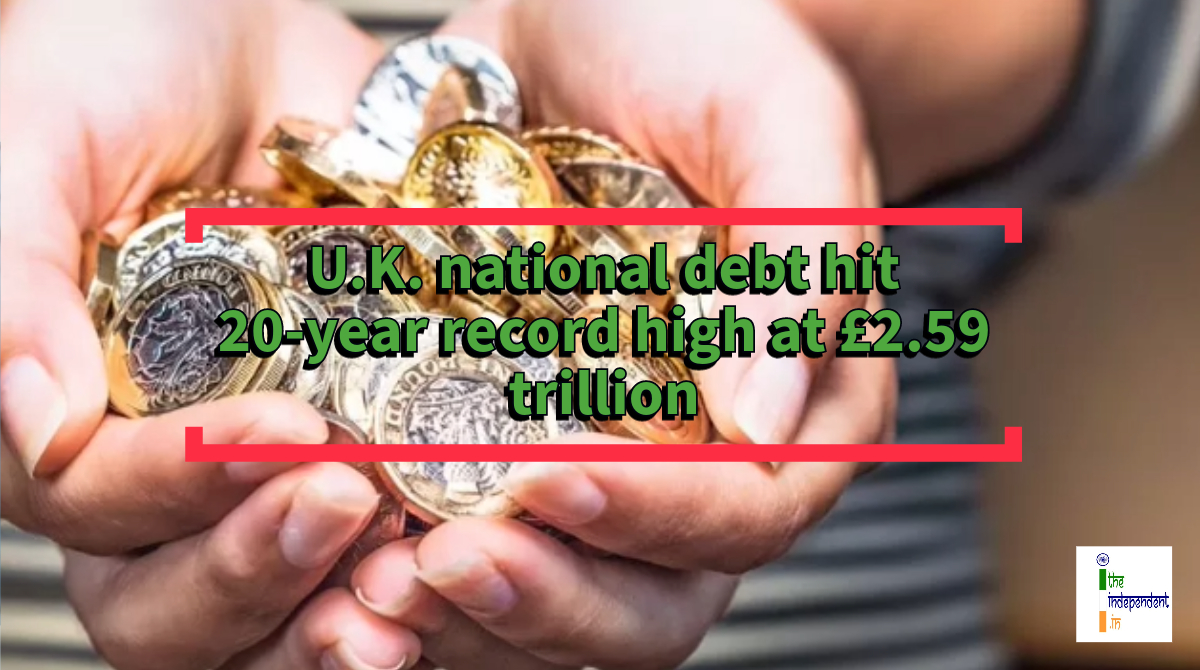
The national debt of U.K. has hit a 20-year record high, with the Government currently owing about £ 2.59 trillion, as the rate on 30-year bonds reached 5.05%
The national debt of the United Kingdom (U.K.) has hit a 20-year record high, with the Government currently owing about £ 2.59 trillion, as the rate on 30-year bonds reached 5.05%.
The Government borrows money by selling financial products called bonds. A bond is a promise to pay money in the future. Most require the borrower to make regular interest payments over the bond’s lifetime. The U.K. Government bonds, known as ‘Gilts’, are normally considered very safe, with little risk the money will not be repaid. These are mainly bought by financial institutions in the U.K. and abroad, such as pension funds, investment funds, banks and insurance companies.
The Bank of England has also bought hundreds of billions of pounds worth of Government bonds in the past to support the economy through a process called ‘Quantitative Easing’. A higher rate of interest on Government debt will mean that the Chancellor to the Exchequer – Jeremy Hunt, will have to set aside more cash, to the tune of £ 23 billion, to meet interest payments to the owners of bonds.
This comes at a time when Hunt is preparing for the autumn statement on November 22, 2023. Hunt has already made clear that tax cuts will not be announced in November 2023. The higher cost of servicing the country’s debt pile could influence the decisions he makes on spending.
This means the government may choose to spend less money on public services like healthcare and schools at a time when workers in key industries are demanding pay rises to match the cost of living. The current level of debt is more than double what was seen from the 1980s through to the financial crisis of 2008. In relation to the size of the economy, today’s debt, is still low compared with much of the last century.
The combination of the financial crash in 2007-2008 and the Coronavirus (COVID-19) pandemic pushed the U.K.’s debt up. Another important factor impacting the U.K. economy is Brexit. Post Brexit, the U.K. is eyeing trade deals with other countries to improve the economy. Brexit also made labour expensive for the U.K. as the industries in the U.K. were relying heavily on migrant labour from the European Union (E.U.). Also, Russia’s invasion of Ukraine, leading to sanctions by the West on Russian entities, individuals and energy, also impacted the economy. During the last financial year, the Government spent £ 111 billion on debt interest, more than it spent on education.
Besides, the United States (U.S.), German and Italian borrowing costs also hit their highest levels for more than a decade as markets adjusted to the prospect of a long period of high interest rates and the need for Governments around the world to borrow.
It follows an indication from global central banks, including the U.S. Federal Reserve and the Bank of England, that interest rates will stay higher for longer to continue their jobs of bringing down inflation.
Some economists fear the Government is borrowing too much and at too great a cost. Others argue extra borrowing helps the economy grow faster – generating more tax revenue in the long run.
The Government’s official economic forecaster, the Office for Budget Responsibility (OBR), has warned that public debt could soar as the population ages and tax income falls. In an ageing population, the proportion of people of working age drops, meaning the Government takes less in tax while paying out more in pensions.







